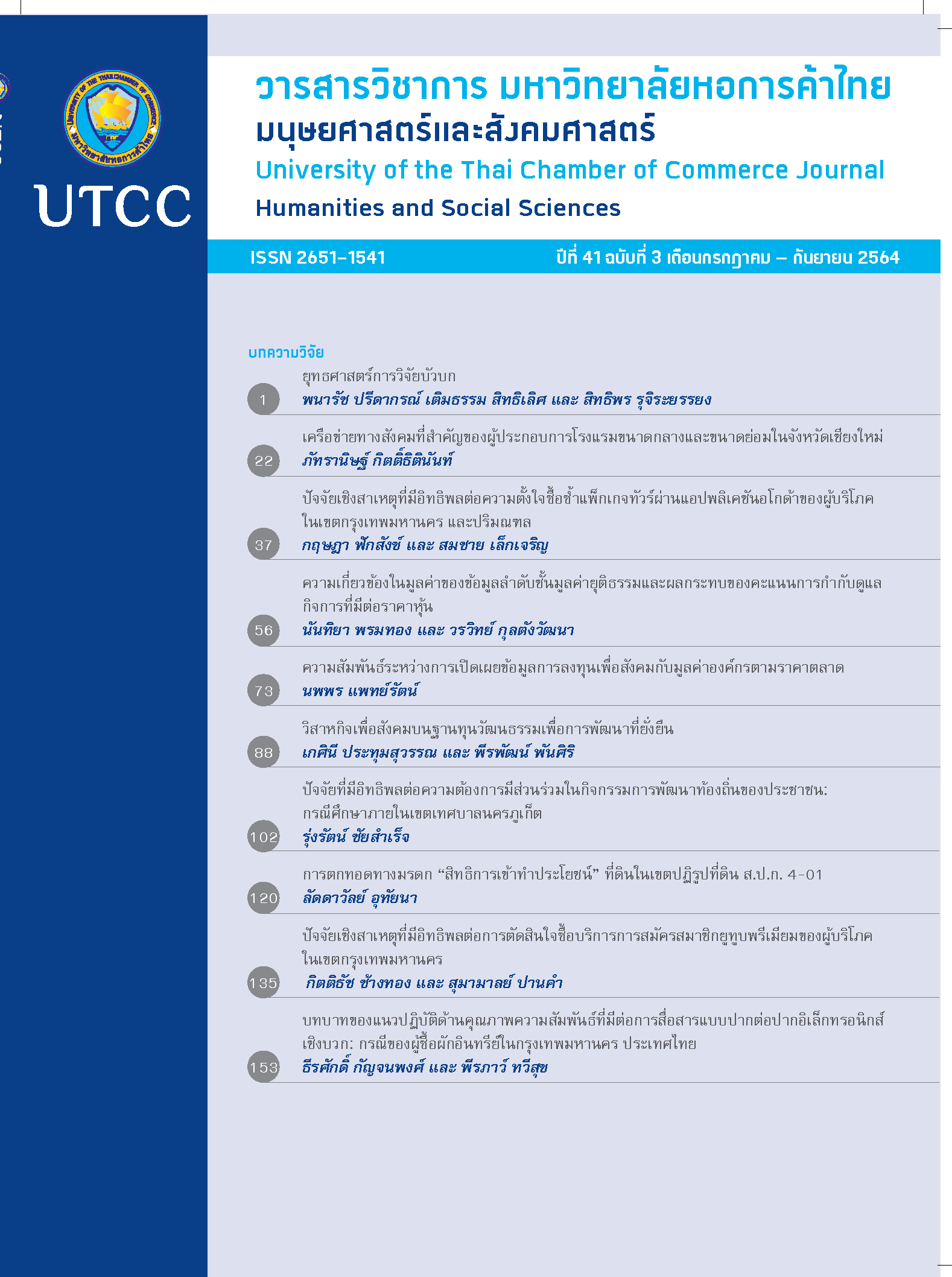ปัจจัยที่มีอิทธิพลต่อความต้องการมีส่วนร่วมในกิจกรรมการพัฒนาท้องถิ่นของประชาชน: กรณีศึกษาภายในเขตเทศบาลนครภูเก็ต
Main Article Content
บทคัดย่อ
การวิจัยเชิงปริมาณนี้มีวัตถุประสงค์เพื่อค้นหาปัจจัยที่มีอิทธิพลต่อความต้องการมีส่วนร่วมในกิจกรรมการพัฒนาท้องถิ่นของประชาชนภายในเขตเทศบาลนครภูเก็ต โดยใช้แบบสอบถามเป็นเครื่องมือเก็บรวบรวมข้อมูลจากกลุ่มตัวอย่าง 420 คน สรุปข้อค้นพบดังนี้ (1) ผลการวิเคราะห์ข้อมูลด้วยสถิติเชิงพรรณนาบ่งชี้ความต้องการมีส่วนร่วมในกิจกรรมการพัฒนาท้องถิ่นที่ระดับปานกลาง และ (2) ผลการวิเคราะห์สมการถดถอยเชิงเส้นแบบพหุคูณ แสดงอำนาจการพยากรณ์ของตัวแปรหลักต่าง ๆ ร่วมกับตัวแปรควบคุม (อายุ ระดับการศึกษา) สามารถอธิบายความแปรปรวนของตัวแปรตามได้ร้อยละ 25 ที่ระดับนัยสำคัญทางสถิติ .001 โดยมีปัจจัยหลักเพียง 3 ตัวแปรที่มีอิทธิพลต่อความต้องการมี
ส่วนร่วมในกิจกรรมการพัฒนาท้องถิ่น ที่ระดับนัยสำคัญทางสถิติ .001 ได้แก่ การเปิดรับข้อมูลข่าวสารเกี่ยวกับการดำเนินงานและกิจกรรมภายในเขตเทศบาล มีอิทธิพลเชิงบวกในระดับปานกลางค่อนข้างต่ำ
(β=0.38) โดยมีสองปัจจัยที่มีอิทธิพลเชิงบวกในระดับต่ำ คือ ประสบการณ์มีส่วนร่วมในกิจกรรมต่าง ๆ ภายในเขตเทศบาล (β=0.19) และการประเมินระดับความรุนแรงของปัญหาที่เกิดขึ้นภายในเขตเทศบาล (β=0.17) ข้อเสนอแนะสำหรับองค์กรปกครองส่วนท้องถิ่นระดับเทศบาล คือ ควรพัฒนาประสิทธิภาพของกระบวนการและกลไกการสื่อสารซึ่งเป็นตัวแปรที่มีอิทธิพลสูงสุด เพื่อช่วยยกระดับการมีส่วนร่วมของภาคประชาชนอย่างยั่งยืน
Article Details

อนุญาตภายใต้เงื่อนไข Creative Commons Attribution-NonCommercial-NoDerivatives 4.0 International License.
ลิขสิทธิ์ของบทความ
ผลงานที่ได้รับการตีพิมพ์ถือเป็นลิขสิทธิ์ของมหาวิทยาลัยหอการค้าไทย ห้ามมิให้นำเนื้อหา ทัศนะ หรือข้อคิดเห็นใด ๆ ของผลงานไปทำซ้ำ ดัดแปลง หรือเผยแพร่ ไม่ว่าทั้งหมดหรือบางส่วนโดยไม่ได้รับอนุญาตเป็นลายลักษณ์อักษรจากมหาวิทยาลัยหอการค้าไทยก่อน
เอกสารอ้างอิง
เทศบาลนครภูเก็ต. (2562). แผนพัฒนาแผนพัฒนาท้องถิ่น (พ.ศ.2561-2565) เทศบาลนครภูเก็ต. สืบค้นจาก https://www.phuketcity.go.th/files/com_develop/2019-10_5c1773888f4d8de.pdf
เทศบาลนครภูเก็ต (2563ก). รายงานผลการติดตามและประเมินผลแผนพัฒนาท้องถิ่น (พ.ศ.2561-2565) ของเทศบาลนครภูเก็ต ประจำปีงบประมาณ 2562 รอบเดือนธันวาคม. สืบค้นจาก https://www.phuketcity.go.th/_old/files/com_news_project/2021-02_fba612d2c851262.pdf
เทศบาลนครภูเก็ต. (2563ข). สถิติประชากร แยกรายละเอียด. ภูเก็ต: ผู้แต่ง.
ภาสกร หอยสังข์ทอง. (2561). ปัจจัยการพัฒนาเมืองอย่างยั่งยืนสำหรับกรุงเทพมหานครและปริมณฑล.
Veridian E-Journal, Silpakorn University ฉบับภาษาไทย สาขามนุษยศาสตร์ สังคมศาสตร์ และศิลปะ, 11(2), 1002-1039.
ลัดดาวรรณ นนปะติ, และวัลลภ รัฐฉัตรานนท์. (2559). การมีส่วนร่วมของประชาชนในการจัดทำแผนพัฒนาขององค์กรปกครองส่วนท้องถิ่น: กรณีศึกษาองค์การบริหารส่วนตาบลวัดละมุด อาเภอนครชัยศรี จังหวัดนครปฐม. วารสารการบริหารปกครอง, 5(2), 289-305.
วัชรินทร์ อินทพรหม. (2557). รูปแบบการมีส่วนร่วมในการพัฒนาท้องถิ่นของประชาชน. วารสารบัณฑิตศึกษา มหาวิทยาลัยราชภัฏวไลยอลงกรณ์ ในพระบรมราชูปถัมภ์, 8(3), 278-289.
สุวรรณิน คณานุวัฒน์. (2559). การมีส่วนร่วมของประชาชนในการพัฒนาท้องถิ่นขององค์การบริหารส่วนตำบลบาละและตำบลกาบัง อำเภอกาบัง จังหวัดยะลา. วารสารวิจัยและพัฒนา วไลยอลงกรณ์ ในพระบรมราชูปถัมภ์ สาขามนุษยศาสตร์และสังคมศาสตร์, 11(1), 269-279.
สำนักงานบริหารและพัฒนาองค์ความรู้. (2558). Now Urbanized | วิถีชีวิต เมือง โอกาส. สืบค้นจากhttp://www.okmd.or.th/upload/pdf/2560/the%20opportunity%20by%20okmd/Booklet_now-urbanized.pdf
เสาวรจนีย์ เสาเกลียว. (2559). การมีส่วนร่วมของประชาชนในการพัฒนาภูมิทัศน์ตลาด 100 ปีระแหง ตำบลระแหง อำเภอลาดหลุมแก้ว จังหวัดปทุมธานี. วารสารวิชาการ มหาวิทยาลัยราชภัฏพระนคร, 7(1), 92-102.
Boyd, A. D. (2017). Examining community perceptions of energy systems development: The role of communication and sense of place. Environmental Communication, 11(2), 184-204. http://dx.doi.org/10.1080/17524032.2015.1047886
Cities Alliance. (n.d.). Strategic city planning. Retrieved December 15, 2020, from https://www.citiesalliance.org/city-development-strategies-cds
Cohen, J. M., & Uphoff, N. T. (1980). Participation’s place in rural development: Seeking clarity through specificity. World Development, 8, 213-235.
Fu, Y. & Ma, W. (2020). Sustainable urban community development: A case study from the perspective of self-governance and public participation. Sustainability. 12(617), 1-15. doi:10.3390/su12020617
Pennink, C. (2016). CDS Toolkit Version 2.0.” Institute of Housing and Urban Development Studies (IHS) & FLMH. Retrieved from http://city-development.org/wp-content/uploads/2016/12/CDS-Toolkit.pdf
International Peacebuilding Advisory Team. (2015). Public participation and citizen engagement: Effective advising in state building and peace building context. Retrieved from https://www.interpeace.org/resource/public-participation-and-citizen-engagement-effective-advising-in-statebuilding-and-peacebuilding-contexts/
Nah, S., Namkoong, K., Chen, N-T N., & Hustedde, R. J. (2016). A communicative approach to community development: The effect of neighborhood storytelling network on civic participation, Community Development, 47(1), 11-28. doi:10.1080/15575330.2015.1094497
Nunkoo, R. (2015). Tourism development and trust in local government. Tourism Management, 46, 623-634.
Polletta, F. (2016). Participatory enthusiasms: a recent history of citizen engagement initiatives, Journal of Civil Society, 12(3), 231-246. doi: 10.1080/17448689.2016.1213505
Prayudi, Ardhanariswari, K.A., & Probosari, N. (2020). The quadruple helix communication model in Yogyakarta’s creative city development. Journal ASPIKOM, 5(2), 294-306.
United Nations, Economic and Social Council. (2017). Urbanization and sustainable development in Asia and the Pacific: Linkages and policy implications. Retrieved from https://www.unescap.org/commission/73/document/E73_16E.pdf
Vermont Department of Housing and Community Development. (2017). The municipal plan: State planning manual – module 1. Retrieved from https://accd.vermont.gov/sites/accdnew/files/documents/CD/CPR/DHCD-Planning-Manual-Module1.pdf


